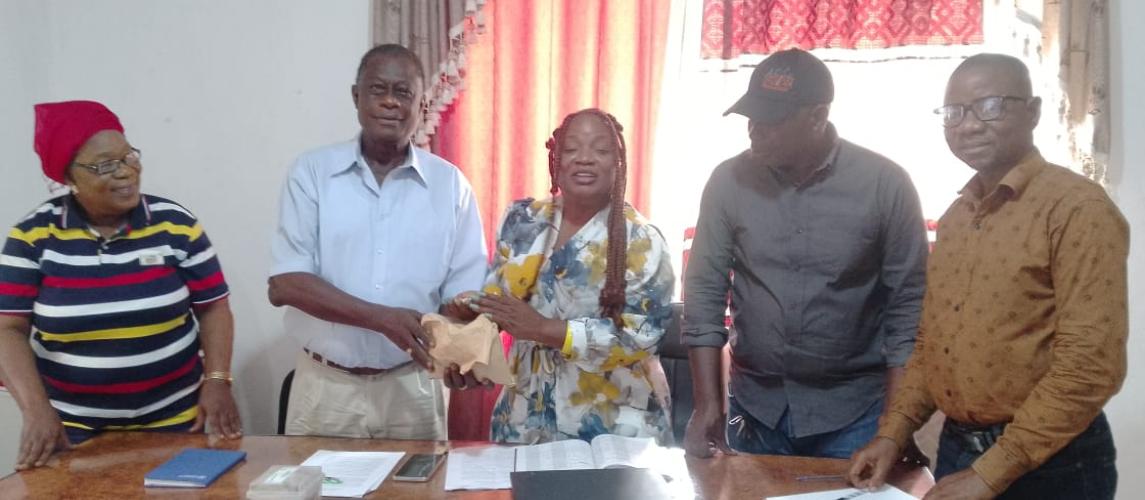
MOA Delivers Over 20 Different Varieties Foundation Seeds for Testing, Adaptability and Multiplication at CARI
SUAKOKO, Liberia — As part of an effort to increase rice productivity and support agricultural initiatives proffered by the government of Liberia, the Assistant Minister for Technical Services at the Ministry of Agriculture has delivered over 20 different varieties of foundation seeds weighing more than 300 grams, to the Central Agricultural Research Institute for multiplication.
Making the presentation on behalf of Dr. J. Alexander Nuetah, Minister of Agriculture, on Tuesday, October 1, 2024, at the main office in Suakoko, Assistant Minister Zogbo Luther informed the administration of the Central Agricultural Research Institute (CARI) that the breeder materials of both ecologies, lowland and upland are to be tested for diseases, adaptation and multiplication.
The delivery of over 20 varieties of foundation seeds to CARI is aimed at boosting productivity and addressing food insecurity in the country, these seeds sourced from Kenyan and other parts of the world, include rice varieties like Wachangu, Kafaci 1, 2, 3, KR842, and 14 others, as well as cowpea for animal feed and Tiger nuts (Accra peanuts) for diverse uses. “It is not only about chewing Accra but producing juice and milk from it or mixing it with our diets,” the Assistant Minister added.
She reiterated that her boss, Dr. Nuetah is poised to ensure that the National Agriculture Plan achieves its objectives. “I brought 20 different varieties, each weighing 15 grams. They were delivered for characterization, multiplication, and released to farmers to produce more rice in the country as Liberia greatly relies on rice consumption.”
She added that because the Minister of Agriculture wants to fill the animal feed production gap, cowpea variety was additionally delivered for multiplication and feed production at the research center. Seeds received from the Minister of Agriculture to CARI will be tested for adoptability to the Liberian climate and environment, disease resistant, and yield output compared with the output of varieties already in country.
The National Agriculture Development Plan, which was developed and launched a few months ago, considers poultry production and animal feed in the country. “In the next few years,” she said, “the Minister’s focus is on how the country can produce animal feed for poultry production.”
“The Minister is thinking about us producing a variety of different things so that we engage our farmers in the country to multiply and make maximum use,’’ she said.
”The Ministry of Agriculture expects that the breeding materials will be multiplied and released to the Liberian farmers so the foundation seeds can be used to produce enough food, more production, and productivity.
“With more production in the country, we will reduce hunger and improve household nutrition.” For many years among all ministers in the government, she thought this was a brilliant idea to bring into the country some breeder materials and hoped that the research center would make maximum use of the planting materials and ensure food security in Liberia.
Speaking on behalf of the institute upon receiving the package, Mrs. Abibatu Kromah, Administrative Assistant to the Director General, appreciated the Minister of Agriculture for the delivery, promising that the researchers are going to apply the appropriate technologies required in the multiplication of the planting materials to develop certified seeds for onward distribution to more farmers across the country.
“We are happy to receive 20 varieties of foundation seeds of both ecologies from African and Asian research centers. The team from the Cereal Crops Unit will conduct test for pest resistant and adaptability before multiplying at various selected sites at CARI,” the Administrative Assistant added.
Since 2008 and 2009 when CARI received the last consignment of breeder seeds from AfricaRice, Mrs. Kromah recalled that this was the first time in more than 15 years. The consignment was later turned over to the team from the Cereal Crops Unit.
